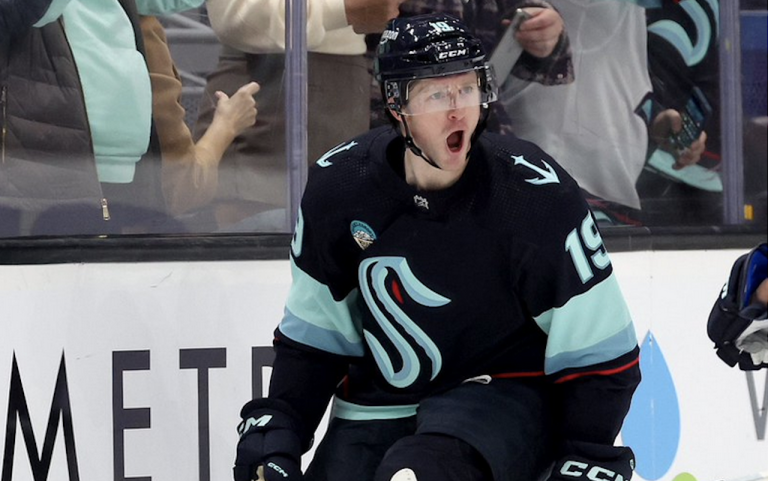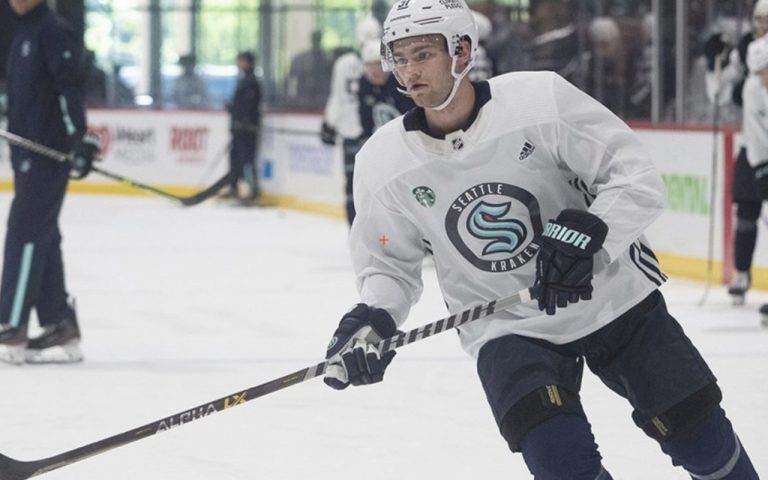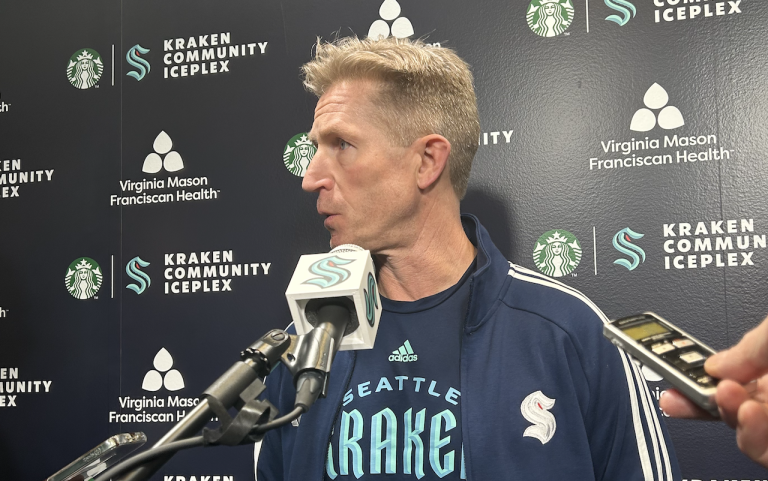While Seattle Kraken fans wait for Tuesday night’s 2nd-round, Game-1 against the Dallas Stars, Kraken coach Dave Hakstol recommends they pause a moment to soak in the series just completed.
People in Hakstol’s profession are trained never to get emotionally too high or too low. Lingering on what just happened can be counter-productive in planning for what could happen next.
So it was reassuring to hear Hakstol’s approval of revelling – at least for a short time – in playoff successes already achieved. Say, like knocking off the defending champion Colorado Avalanche in a thrilling seven game series.
“Along the way, you’ve got to take a few seconds to enjoy things,” said the coach, with advice pertaining to his players as well as fans. “That doesn’t mean you’re letting your foot off the gas. It doesn’t mean you’re not focused on the next game. Everybody’s got the ability to enjoy it for a few minutes. Then we get moving on.”
It’s not surprising that Hakstol would proffer wise words. After all, he was a highly successful college coach at the University of North Dakota from 2004-15.
Kraken Lessons Of Joy
On the topic of lessons, the Kraken delivered several to the faithful during their series with Colorado.
Beforehand, every Seattle local with experience took a stab at explaining playoff hockey. Players, coaches, broadcasters, and writers all attempted to share why the postseason was “different,” and why the NHL postseason has no peer.
For Game-3, the first Kraken home playoff game, a raucous crowd showed up (and “showed out,” in the words of Seahawks star Marshawn Lynch in a recorded video). Hours before game time, the band played, ice sculptures were carved, and hundreds of fans in Kraken sweaters milled outside.
Unfortunately, the visiting Avalanche proved poor house guests. Colorado raced to a 3-1 lead, dominating play even while shorthanded. Seattle seemed stuck in quicksand – both on the ice and in the stands.
That’s when the Kraken delivered the first lesson.
Belying his 6-foot-7, 255-pound frame, defenseman Jamie Oleksiak skated around Mikko Rantanen like the Colorado forward was a traffic cone. Oleksiak whipped a backhand home, cutting Seattle’s deficit to 3-2.
Public Address announcer Chet Buchanan hadn’t finished announcing that goal when Matty Beniers, at the top of the crease, kicked puck to stick and deposited the tying score. Just before it happened, this site’s managing editor, Rob Simpson, predicted to a pressbox colleague, “The Kraken are going to score again, and in short order.”
Short order, indeed. In 19 seconds of playing time, Climate Pledge Arena morphed from moribund to frenzy. Fans still screaming over the Oleksiak goal somehow found a way to get louder. Better than words ever could, the Kraken demonstrated the magic that is playoff hockey.
Class was back in session at Climate Pledge Arena during Game-4. In playoff hockey, familiarity breeds contempt. When a member of the opposition – in this case, Cale Makar – injures your top goal scorer (Jared McCann) with a late hit, that contempt gets focused. Lusty boos™ followed Makar in Seattle from that moment forward, 17,000 full-throated voices expressing the profound joy of sports hatred.
In overtime, the carryover lesson from Game-3 was amplified tenfold. The best revenge for the loss of McCann came three minutes into OT. In the blink of an eye, Jordan Eberle swept a deflected puck into the net for a 3-2 Kraken victory. Cue pandemonium.
In other sports, spectators have the chance to anticipate a pivotal play in progress: will the outfielder make the catch? Will the field goal split the uprights? Will the three-pointer find its mark? That happens in hockey, too, but not always. The Oleksiak, Beniers, and Eberle goals were electric shocks administered without warning. The jolts were felt on the ice, on the players’ benches, and in every seat in the house.
These are the unique exhilarations of playoff hockey. So listen to coach Hakstol and take a moment more to enjoy. Then you can resume biting your nails.



